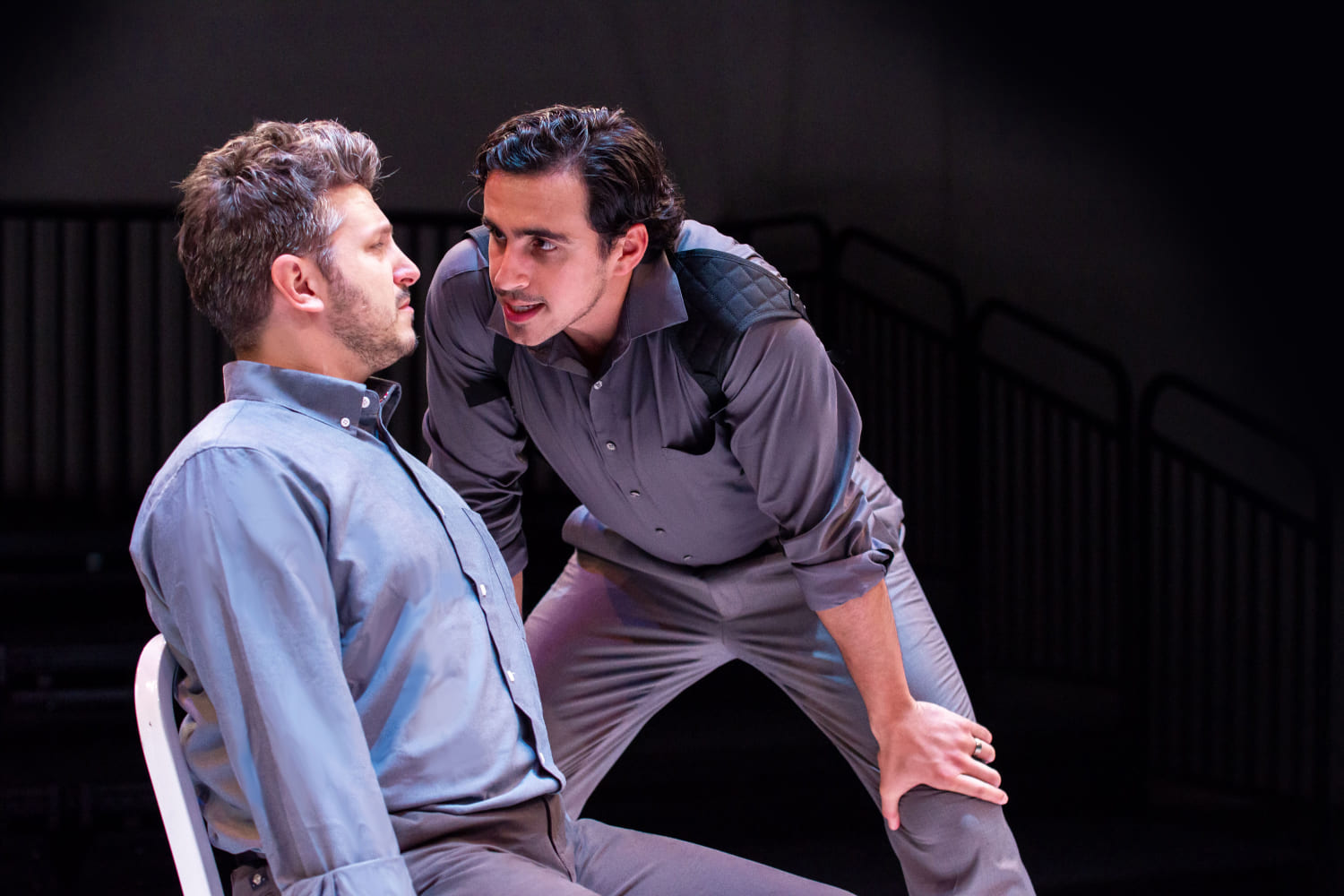
Ariel (Gabriell Salgado) deals aggressively with Katurian (Ryan Didato) in Zoetic Stage's production of "The Pillowman." (Photo by Justin Namon)
"We like executing writers."
This quote from Martin McDonagh’s moving and macabre masterpiece, “The Pillowman” can be chilling to hear anytime. However, when your country is perhaps on the verge of re-electing a presidential candidate who claims he will be a dictator from day one, your shivering is bound to be more pronounced.
And when you hear an authority figure nonchalantly speak the aforementioned line, the chill may run up and down your spine. Therefore, it may be wise to bring a sweater to Zoetic Stage Company’s dark and funny, touching, intense and believable professional production of “The Pillowman.” Then again, the less than three-hour production, which includes a 15-minute intermission, packs plenty of heat. So, maybe you should keep your sweater at home.
Zoetic’s Carbonell Award-worthy mounting, which opens the multi award-winning, nonprofit company’s 15th anniversary season, runs through Sunday, Nov. 10 in the intimate Carnival Studio Theater at the Adrienne Arsht Center in downtown Miami.
Local, talented actors Ryan Didato, Michael McKeever, Gabriell Salgado, and Seth Trucks star in the production, which features deft direction by Zoetic artistic director Stuart Meltzer and first-rate design work by behind-the-scenes artists. They include B.J. Duncan (scenic design), Becky Montero (lighting), Laura Turnbull (costumes) and Matt Corey (sound).
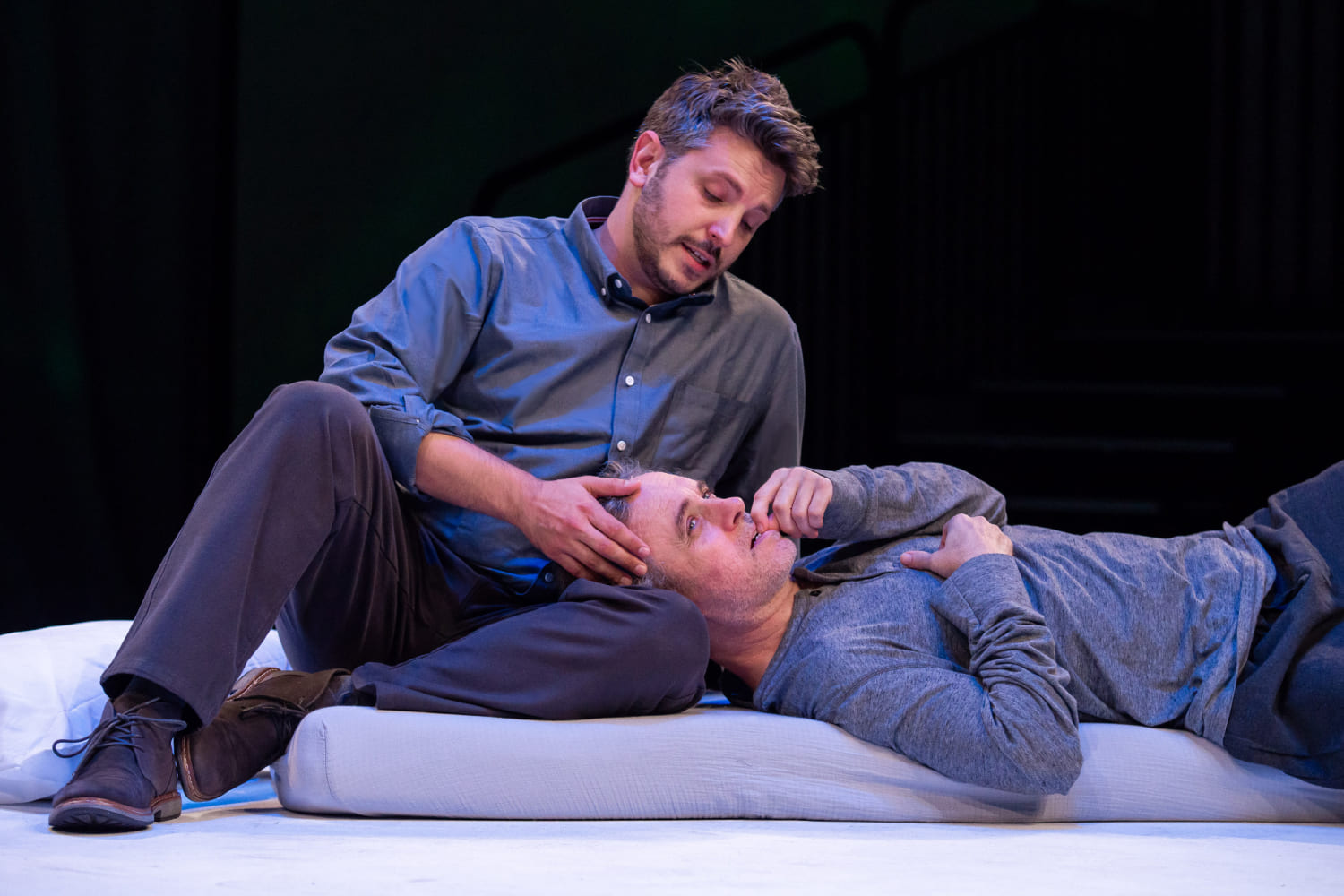
Brothers Katurian (Ryan Didato, sitting) and Michal (Seth Trucks) share a moment.(Photo by Justin Namon)
“The Pillowman” takes place in an unnamed totalitarian state during an unspecified time period. The piece centers on a writer whom police are interrogating at a jail or prison about the gruesome content of his short stories and their similarities to a series of recent child murders.
While we may assume that the writer, Katurian (Didato), fears for his life (authorities plan to execute him if he’s guilty and maybe even if he’s not), he fears most that the policemen will destroy his stories. After all, Katurian’s many tales give him a purpose to live, and he views them as his greatest legacy that can outlive him.
One of the cops, Tupolski, claims he’s the “good cop” in a good-cop bad-cop setup. Tupolski (McKeever) tells Katurian that “we like executing writers.” And McKeever says the line in an understated tone, making it sound shockingly funny. In fact, you may laugh and squirm at the same time during this and other moments from Zoetic’s production.
While Tupolski is the “good cop,” Ariel (Salgado) is the “bad cop” of the pair and the authority figure more likely to physically torture the prisoner. But Katurian won’t budge much…until he realizes he may have to make a deal with the policemen. However, shortly after the writer’s mentally challenged brother, Michal (Trucks) arrives at the jail, everything changes. The play includes at least one twist, so we won’t spoil it by revealing too much here.
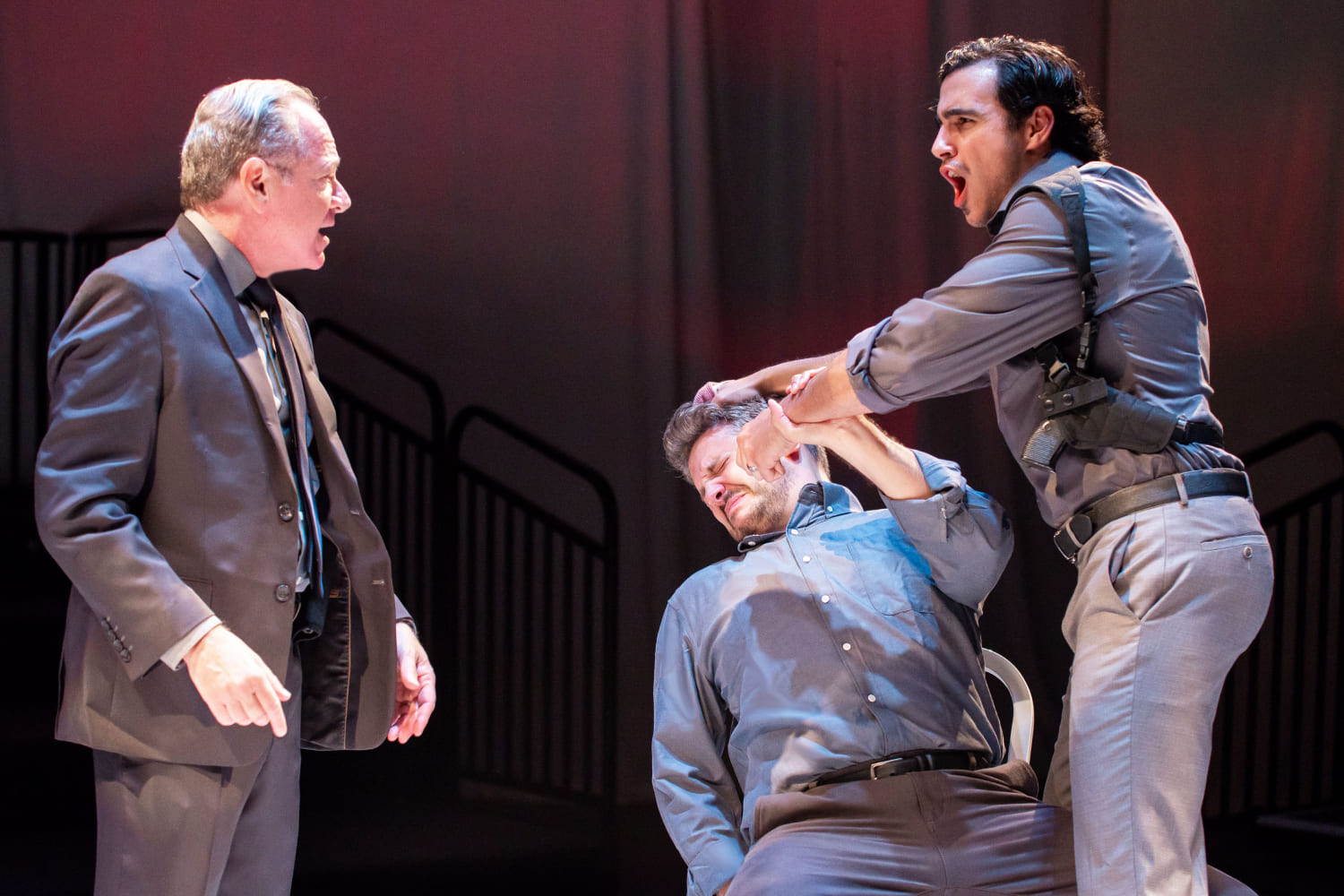
Policemen Tupolski (Michael McKeever) and Ariel (Gabriell Salgado) don't always agree on how to handle matters as Ariel punches Katurian (Ryan Didato). (Photo by Justin Namon)
The multi award-winning McDonagh, one of the most acclaimed European playwrights of the late 20th and early 21st century, is famous for cleverly blending the tender and the grotesque. In addition, this British-Irish playwright has a unique ability to shock audiences and make them laugh, at times simultaneously.
So, when one of the cops in “The Pillowman” arrives back at the station with the latest evidence – toes that the killer chopped off a kid whom he killed – you may understandably react strongly. In Zoetic’s production, Salgado, as Ariel, plops down the digits in a business-as-usual manner. It’s an example of this cast’s skillful use of understatement and sarcasm to earn laughs; the actors never show off or beg for them.
While McDonagh shines at shocking audiences and making them laugh, that’s not all he sets out to accomplish. Indeed, “The Pillowman” is also a cautionary tale about what can happen when the wrong people receive too much power, making this timeless piece especially timely today. Also, this cleverly crafted, disturbing play with multiple layers is about censorship, police tactics and brutality, legacy, cruelty, creativity, torture, mental illness, moral ambiguity, the power of stories, as well as the nature and purpose of art.
Certainly, this complex piece will make you think. For example, McDonagh asks where an artist’s creative expression ends and his or her moral responsibility begins. In particular, if a piece of art graphically depicts the murders of children, does the artist bear any responsibility if it leads to real-life murders?
Among other things, narrative art animates this play. To be specific, Katurian reads from his stories that have prompted the police’s investigation. And Zoetic Stage makes good use of technology by incorporating illustrations and narration voice-overs, both of which further enliven the production.
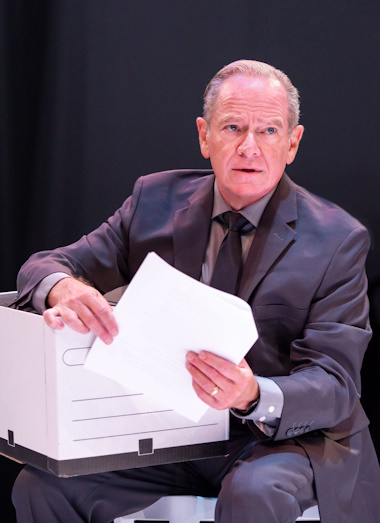
Photographer: LiVELTRA
Tupolski (Michael McKeever) tries to be thorough about things. (Photo by Justin Namon)
In addition to skillfully portraying a major role, the program credits McKeever with creating the projection illustrations, while Corey’s contributions to the production include projection mapping.
As Katurian narrates, impressively-drawn illustrations appear on several tall projection screens, while uncredited voiceovers include the mother of one of the children in Katurian’s stories.
There are at least four projection screens upon which text from Katurian’s stories appear. You’d have to try really hard to look away from them – there are projection screens on all four sides of the theatre-in-the-round, circular stage. This fact might reinforce the notion that technology has made literature and other writings omnipresent in society.
By the way, the play’s title is also the title of one of Katurian’s stories. Specifically, in Katurian’s short story, “The Pillowman,” a man made from pillows identifies people who have led a hard life and travels back in time to these individuals’ childhood. Then, he tries to convince the children to commit suicide; if they kill themselves, they’ll spare themselves suffering later in life.
Undoubtedly, we acutely sense, even feel Katurian’s suffering in Zoetic’s production. That is partly because Didato’s face registers some of the most vivid and seemingly real expressions of emotional pain and agony that I’ve seen in more than four decades of theatergoing. From the actor’s facial expressions alone, you want to ascend the stage and comfort his character. The man really looks as though he is pleading desperately for his life while someone points a loaded gun at him.
As Katurian, Didato’s sharp and expressive voice convincingly conveys panic, conviction, urgency, and resolve.
At times, Didato and other actors position themselves on the floor or atop props such as tables as part of Meltzer’s sensitive, detailed direction. Sitting so low or standing so high allow the actors to reinforce their characters’ emotional state. For example, at one point, Katurian is on the floor clinging to his brother’s leg in an intensely desperate moment.
Speaking of the siblings in the play, “The Pillowman” is a truly moving tale of a brotherly bond that will touch your heart – and break it. As a matter of fact, the relationship that Katurian and Michal share may remind you of the one between George and Lenny in John Steinbeck’s classic novel, “Of Mice and Men.”
As the man-child, Michal, the versatile Trucks is doing some of his best work. With a sunny smile, the performer naturally radiates infectious childlike joy and innocence, instantly endearing us to his character while also portraying the mentally-challenged character with sensitivity and soulfulness. Surely, your heart will melt after you hear Trucks’ good-natured Michal comfort his brother by gently and sincerely telling him, “Don’t cry Katurian, it will be alright.” During another moment, you may laugh after Trucks’ Michal, listening to one of his brother’s stories, asks him, “Can you skip to the end please” and then plops himself back down onto a cot like a child who is a bit antsy and frustrated. Of course, you also feel for him after he covers his ears and a painful expression registers on his face as he reacts to a loud noise.
Didato and Trucks share a strong chemistry as brothers who love each other but also get on each other’s nerves and even infuriate each other. Indeed, it’s hard to look when, in a rage, Didato’s Katurian viciously grabs Michal by the shirt and demands something from him. But you feel better when one of the siblings reassuringly pats the other’s shoulder or puts an arm around the other.
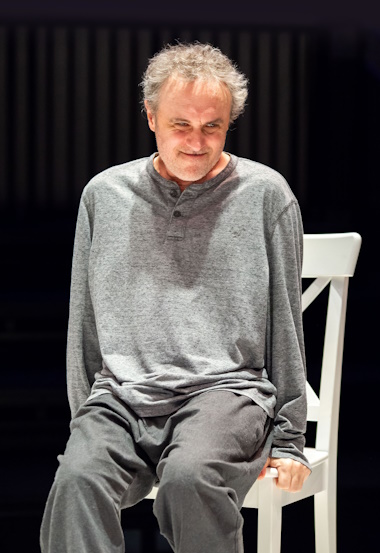
Photographer: LiVELTRA
Mentally challenged man-child Michal (Seth Trucks) expresses himself. (Photo by Justin Namon)
Salgado, a young, award-winning actor who has quickly become a highly in-demand performer in South Florida live theater, portrays Ariel with impressive unpredictability. In an instant, Salgado seamlessly switches from playing a pleasantly smiling yet sarcastic cop to one with a vicious, in your face menacing quality. Salgado’s Ariel often leans forward in an aggressive posture before charging Katurian and violently manhandling him. Cross him at your own risk.
“Oh, I almost forgot to mention…I’m the good cop, he’s the bad cop,” Tuploski says slowly and casually at one point, after which Salgado’s Ariel smiles and waves at Katurian. Clearly, these performers understand this playwright’s brand of humor.
McKeever’s flush-faced Tupolski can be charmingly low-key and seemingly concerned about Katurian before suddenly thunderously shouting. But mostly, McKeever’s Tuploski is the less threatening, more sarcastic and uptight cop. Of course, McKeever is also a versatile playwright and Zoetic Stage’s producing director.
In addition to the adult actors, child performer Diana Saba briefly appears as a sweetly smiling youngster in one of Katurian’s stories.
The actors perform on a circular stage with minimal scenic design by Duncan. Actually, aside from a few chairs, the space is empty. That’s a good thing; it lets us concentrate on the story and characters.
With audience members surrounding the stage on four sides, it’s almost as though performers are trapped in the space; they cannot leave the jail or prison that serves as the story’s setting.
Montero’s lighting design contrasts realism (bright lighting) from fantasy scenes including narration, during which dimmer lighting bathes the stage. Also, Montero’s lighting wisely turns red during heated scenes, suggesting violence and passion, and green for Katurian’s story titled “The Little Green Pig.” It is one of Katurian’s least violent tales.
In the costume department, Turnbull clothes the actors mostly in dark colors which befit “The Pillowman’s” dark subject matter. And Corey’s sound design renders each and every word intelligible, while also including realistic sounding effects that enhance the piece’s suspense.
At less than three hours, “The Pillowman” can seem overly long at times, including a first act that lasts more than an hour and a half. Frankly, the first act’s ending may leave you thinking that the show is over when in reality, another half remains.
Mostly, Meltzer’s pacing is just right – not too fast, not too slow. Certainly, you’ll want to savor every moment of Zoetic’s compelling production of a mesmerizing play that will make you laugh, gasp, and cry in equal measures.
IF YOU GO
WHAT: Zoetic Stage’s powerful production of Martin McDonagh’s disturbing, moving, and entertaining play, “The Pillowman.”
WHEN: Through Sunday, Nov. 10.
WHERE: The Adrienne Arsht Center’s Carnival Studio Theater, 1300 Biscayne Blvd in downtown Miami
TICKETS: $56-$61.
INFORMATION: Go to www.arshtcenter.org or call (305) 949-6722.




